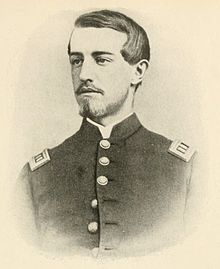Ulric Dahlgren
| Ulric Dahlgren | |
|---|---|

Col. Ulric Dahlgren (seen here as a captain)
|
|
| Born |
April 3, 1842 Bucks County, Pennsylvania |
| Died | March 2, 1864 (aged 21) (near Stevensville), King and Queen County, Virginia |
| Buried at | Laurel Hill Cemetery, Philadelphia, Pennsylvania |
| Allegiance |
United States of America Union |
| Service/branch |
United States Navy Union Navy United States Army Union Army |
| Years of service | 1861 - 1862 (Union Navy) 1862 - 1864 (Union Army) |
| Rank |
|
| Wars | American Civil War |
| Relations | Rear Admiral John A. Dahlgren (father) |
Ulric Dahlgren (April 3, 1842 – March 2, 1864) was a colonel in the Union Army during the American Civil War. In 1864, he led an unsuccessful raid on the Confederate capital of Richmond, Virginia, and was killed. The failed raid resulted in the Dahlgren Affair after incriminating documents were discovered on Dahlgren's corpse.
Ulric Dahlgren was born April 3, 1842, to Rear Admiral John A. Dahlgren and Mary Clement Bunker.
A second son to his parents, Dahlgren was born in Bucks County, Pennsylvania.
After completing school in 1858, Dahlgren's father supplied him with instruction in the field of civil engineering and by 1859, he was busy surveying land in Mississippi. In September 1860, with the support of his father who appears to be steering his son away from public service, he ventured to Philadelphia, Pennsylvania where he found work at a law office.
Following the inauguration of the 16th U.S. President, Abraham Lincoln, in March 1861, Dahlgren entered military service and thus before July 24, 1861 he joined the U.S. Navy since on that date he was on a U.S. Navy expedition from the Washington Ship Yard to help in the defense of Alexandria, Virginia. On May 29, 1862, Dahlgren was transferred from the U.S. Navy to the U.S. Army and promoted to captain by the U.S. Secretary of War Edwin M. Stanton who quickly recognized his gunnery talent while at Harpers Ferry. He was active on behalf of the U.S. Army at the Second Battle of Bull Run and the Battle of Fredericksburg both in 1862 and at the Battle of Chancellorsville, the Battle of Brandy Station, as well as the Battle of Gettysburg in 1863. Wounded on July 6, 1863 while trying to reach Hagerstown, Maryland, he had to have his foot amputated.
...
Wikipedia
